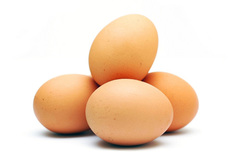 Aim to eat breakfast no later than 30mins after rising. Try also having warm water with a slice of lemon, which contains a compound called limonene (especially high in the peel). Good for encouraging toxin excretion and stimulating the digestive system. Eggs Eggs are famously eaten for breakfast because they are quick, healthy and high in protein to set you up for the day. Here are some healthy egg choices (just avoid fried eggs):
Bread Provided you have no issues with gluten, and given the right topping, bread can be a filling choice for breakfast. Just try and limit to one slice and stick to rye, wholemeal or sourdough. Try toast with mashed avocado, almond butter, boiled eggs or mashed sardines and cherry tomatoes. Smoothies There are no hard and fast rules for smoothies other than be creative and try not to include more than 1-2 servings of fruit. Berries are a good option as they are rich in nutrients and lower in fructose than other fruit. For extra nutrient boost try adding a green vegetable such as kale or spinach with a fruit. Rather than using milk, try a milk substitute such as almond milk or coconut milk, or even just plain natural yoghurt. Also include flaxseed, oats or chia seeds for anti-inflammatory omega 3. Adding a protein powder or a nut butter is also beneficial to keep you feeling fuller for longer. For the adventurous you can buy spirulina or wheatgrass powder for an extra nutrient boost. Oats Oats are a great way to start the day, a rich source of soluble fibre, which will keep you feeling fuller for longer and help balance blood sugar levels. Try bircher muesli: oats soaked overnight, milk (organic or nut milk), grated apple, apple juice, honey, cinnamon and a small handful of nuts and seeds. Porridge is also another great alternative – just keep sweet toppings such as honey or sugar to a minimum or avoid altogether. Chia Pudding Chia seeds are high in fibre, protein, antioxidants and omega 3 essential fatty acids. Try overnight soaked chia seeds (for every ½ cup chia seeds, add 3 cups of liquid) in natural yoghurt / coconut milk with fruit and chopped nuts such as almonds or pistachios.
1 Comment
Patrick
1/11/2016 01:15:06 pm
loving the breakfast ideas
Reply
Leave a Reply. |
AuthorLouise Cullen Archives
October 2020
Categories
All
|
 RSS Feed
RSS Feed
